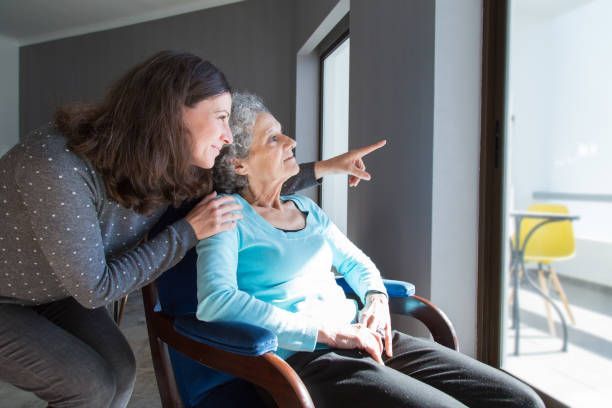Tell Me More About Therapy Dolls for Individuals with Dementia
As reported in by National Institutes of Health "our findings suggest that doll therapy improved the emotional state, diminished disturbing behaviors, and enhanced communication with the environment in dementia patients. However, randomized studies with a greater sample size and methodological rigor are needed, as well as follow-up protocols to reaffirm these results."
More, Elizabeth Cai, MSN, RN, CMSRN from the Cleveland Clinic states "caring for a doll can put structure and sense of responsibility back into the lives of
patients with dementia and provide them with comfort."

In the tender journey of caring for individuals with dementia, 7 Day Home Care recognizes there are innovative approaches that may enhance the well-being and comfort of our clients. One such compassionate initiative that can be impactful is the incorporation of therapy dolls. In the gentle embrace of lifelike dolls, some have discovered a powerful tool that not only provides emotional solace but also cultivates a sense of purpose and connection for individuals on this poignant path. Join us as we review the therapeutic realm of doll therapy.
The use of therapy dolls for individuals with dementia has roots in the concept of doll therapy, which emerged as a non-pharmacological intervention in dementia care. The origin can be traced back to the mid-20th century when pioneers in the field of geriatrics and dementia care began exploring alternative approaches to enhance the well-being of individuals experiencing cognitive decline.
Doll therapy was inspired by the idea of reminiscence therapy, which involves stimulating memories and emotions from the past as a means of improving cognitive function and overall mood. Providing individuals with dementia lifelike dolls was seen as a way to tap into their memories of nurturing, caregiving, and familial bonds.
The concept gained momentum as caregivers and healthcare professionals observed positive responses in individuals with dementia. The dolls provided a source of comfort, reduced anxiety and agitation, and offered a sense of purpose to those who may have had roles as caregivers earlier in their lives.
Over time, research and anecdotal evidence supported the notion that therapy dolls could be valuable tools in dementia care. They became a part of a broader range of non-pharmacological interventions aimed at improving the quality of life for individuals with dementia.
It's important to note that while therapy dolls can be beneficial for some individuals, this approach is not universally accepted, and the use of such interventions should be approached with consideration for the individual's preferences, cultural background, and ethical considerations. The effectiveness of therapy dolls can vary from person to person, and their use should be part of a comprehensive, person-centered care plan.
Some Potential Benefits of Therapy Dolls for Dementia:
- Reduced anxiety and agitation: The act of holding and caring for a doll can trigger the release of oxytocin, a hormone associated with bonding and feelings of calm. This can be especially helpful for individuals who experience anxiety or agitation due to their dementia.
- Increased social interaction: Dolls can provide a focus for conversation and interaction, both with caregivers and other residents in a care setting. This can help combat loneliness and isolation, which are common challenges for people with dementia.
- Improved mood and well-being: Studies have shown that doll therapy can lead to increased smiling, laughter, and overall improved mood in individuals with dementia. The sense of purpose and responsibility that comes with caring for a doll can also contribute to a feeling of well-being.
- Management of challenging behaviors: Dolls can be used to redirect attention away from unwanted behaviors and provide a safe outlet for expressing emotions. For example, a person who is pacing or restless may find comfort in simply holding a doll.
Here Are Some Considerations For Choosing a Therapy Doll:
- Appearance: Dolls come in a variety of styles and appearances, from realistic baby dolls to soft, cuddly animal companions. It's important to choose a doll that the individual will find appealing and comforting.
- Weight: Some dolls are weighted to feel more like a real baby, which can be comforting for some individuals. However, it's important to choose a doll that is not too heavy for the individual to handle.
- Features: Some dolls have interactive features, such as sounds or blinking eyes. These can be stimulating and engaging for some individuals, but they may be overwhelming for others.
- Safety: Make sure the doll is made from safe materials and is free of any small parts that could be a choking hazard.
Here are Some Additional Tips for Using Therapy Dolls with Individuals with Dementia:
- Introduce the doll gradually: Let the individual get used to the doll before forcing interaction.
- Follow the individual's lead: Allow the individual to decide how they want to interact with the doll. Some people may want to hold it, cuddle it, or simply have it nearby.
- Use the doll as a tool for conversation: Talk about the doll's name, age, family, or any other details that the individual finds interesting.
- Be patient and understanding: It may take some time for the individual to warm up to the doll. Be patient and encouraging, and never force interaction.
If you're considering using a therapy doll for someone you know with dementia, it's always a good idea to talk to their doctor or therapist first. They can help you choose the right doll and provide guidance on how to use it effectively. Here are some examples of therapy dolls that may be suitable for individuals with dementia:
- Cuddle dolls: These soft, huggable dolls are often made from materials like fleece or velour. They come in a variety of sizes and styles, and many have weighted features that provide a comforting sensation.
- Interactive dolls: These dolls have features that respond to touch or sound, such as blinking eyes, cooing sounds, or even singing songs. While not suitable for everyone, some individuals with dementia may find these dolls to be stimulating and engaging.
- Realistic baby dolls: These dolls are designed to look and feel like real babies. They can be especially comforting for individuals with dementia who have lost a child or who have difficulty caring for themselves.
It's important to remember that there is no one-size-fits-all approach to doll therapy. What works for one person may not work for another. The most important thing, if possible is to choose a doll that the individual will find comforting and engaging.
7 Day Home Care is dedicated to delivering specialized dementia care across the diverse communities of Manhattan, Queens, Brooklyn, Nassau County, and Suffolk County, New York. Our compassionate and highly trained caregivers are committed to providing individualized support for those navigating the challenges of dementia. With a focus on enhancing the quality of life for our clients, we tailor our care services to meet the unique needs of each individual, fostering an environment of comfort and familiarity. Whether in the bustling streets of Manhattan or the serene neighborhoods of Suffolk County, our goal is to ensure that those affected by dementia receive the highest standard of care, allowing them to age in place with dignity and compassion. Contact us today at 516-408-0034 or view 7 Day Home Care to learn more about our affordable dementia care services in NYC and Long Island, New York.
Brian Callahan
7 Day Home Care










